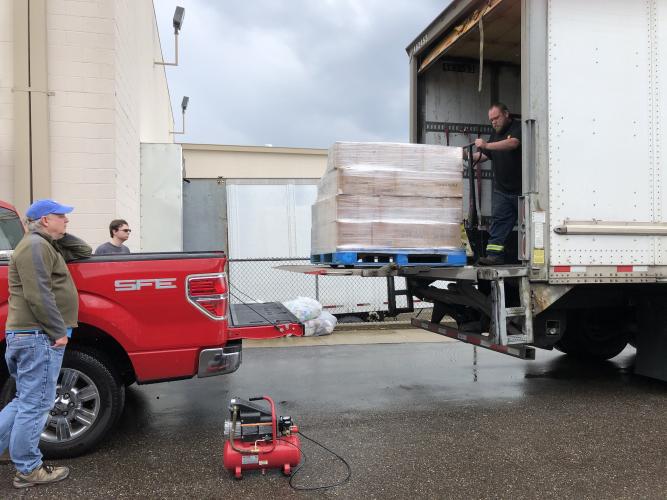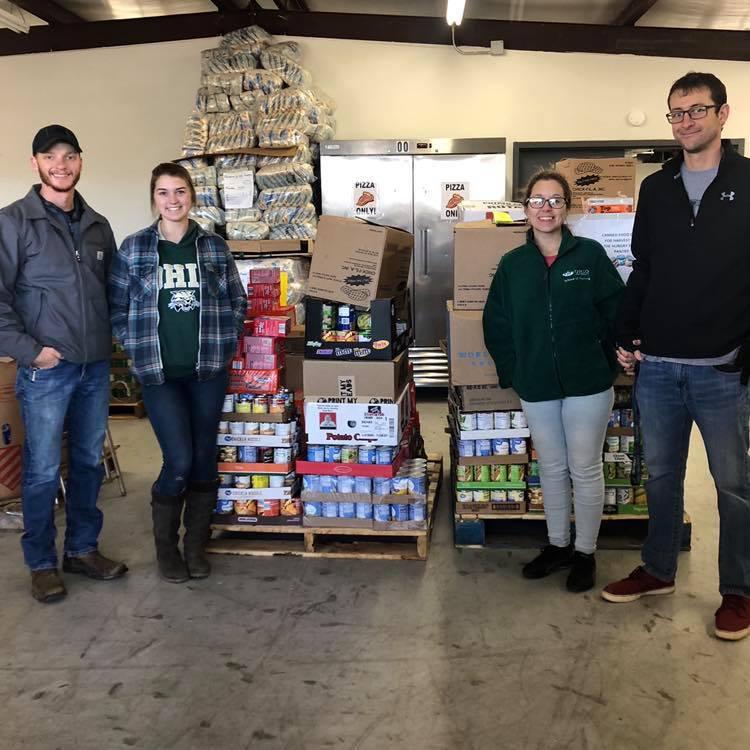
Ohio University supports community partnerships responding to COVID-19

From sewing masks and distributing hand sanitizer to developing hybrid models for career connected learning and studying emergency food distribution, community members and University partners are coming together across the region to combat COVID-19.
Ohio University’s Center for Campus and Community Engagement, with support from the Heritage College of Osteopathic Medicine’s Infectious and Tropical Disease Institute, awarded $30,000 to nine projects responding to the impact of the pandemic in their communities.
Four initiatives focused primarily on public health through research and provision of emergency supplies and personal protective equipment to local business, human service agencies and community members.
First Step, Sanitize: Dr. Sarah Mahan-Hays at Ohio University Eastern and Crystal Lorimor, executive director of the Community Improvement Corporation of Belmont County, partnered to provide over 1,000 bottles of hand sanitizer to aid local businesses in reopening efforts in Belmont County.
"For small businesses, every bit helps,” Lorimor said. “We have tried to find them answers, products, and resources through all of this, so they would know they were not alone."
Mask Makers & Ear Savers of Athens Ohio: The Masks Now Coalition of Southeast Ohio is a collaborative project, including Passion Works, the Nelsonville Quilt Company, the Athens City-County Health Department, Athens Dental Arts, Ohio University and a collective of over 350 community members, who have produced thousands of masks for organizations and individuals in the region.
"Masks have been found to be an effective tool in the fight against the SARS-CoV-2 virus that causes COVID-19,” said Associate Professor of Public Health Heather Harmon. “When the pandemic began, there was an immediate need for a large quantity of masks that didn't exist. Volunteers from all over the region came together and filled that need."
The effort has now been joined by the Russ College of Engineering, where Dr. Jesus Pagan is leading an effort to manufacture ear savers for healthcare workers that will be distributed alongside masks.
Perinatal Mental Health Screening and the Psychosocial Effects of the COVID-19 Pandemic on Vulnerable Pregnant Women Seeking Prenatal Care Services in Central Ohio: Dr. Sarah Rubin and colleagues from the Heritage College of Osteopathic Medicine on the Dublin Campus will work with Step One For a Healthy Pregnancy in Columbus to study perinatal mental health and psychosocial effects of COVID-19 on vulnerable pregnant women seeking prenatal support.
Regionals Reaching Out to our Communities: In Chillicothe, the Ross County Recovery and Outreach Center has more than doubled its services — increasing from serving meals to roughly 50 people per day, six days a week, to 100 people seven days per week now. Similarly, the Lawrence County Emergency Management Agency lacked sufficient hygiene supplies to sustain services at its 12 food pantries.
To help address these shortages, Joy Shytle, Associate Professor of Instruction in Social Work and Nicole Stumbo, Lecturer of Nursing at Southern, and Stacey Saunders-Adams, Assistant Professor of Social Work at Ohio University Chillicothe developed a collaborative effort to provide hygiene kits and emergency food. The project will also engage students to work with community partners to develop healthcare education resources for partners to distribute.
“Working with the Lawrence County Emergency Management Agency and our Ross County partner provides opportunities for social work and nursing students to engage in meaningful ways in COVID-19 response,” said Executive Dean for Regional Higher Education and Ohio University Southern Dean for Campus and Community Relations Nicole Pennington.
Housing and food security were also identified as key priorities.
Emergency Food & COVID-19: Dr. Harold Perkins in the College of Arts and Sciences is working with Community Food Initiatives to study emergency food distribution to improve resiliency of local food systems and add to the existing SEO FOODLINK mapping initiative.
Landlord Negotiations for International Students: Diane Cahill and the Ohio University Office of Global Affairs are partnering with Athens Area Mediation Services to support landlord negotiations on behalf of vulnerable international students. AAMS will negotiate with landlords on behalf of international students who were excluded from CARES Act support, stranded by travel restrictions, and relying on stipends or campus employment that was impacted by the COVID-19 shutdown.
Housing Women and Families Experiencing Domestic Violence: A partnership between Sue Meeks in the Heritage College of Osteopathic Medicine and My Sister’s Place received funding to support solutions for victims of domestic violence who the shelter is currently unable to house.
“The pandemic has left us with many questions about how to continue safely sheltering victims of domestic violence,” said My Sister’s Place Executive Director Kelly Cooke. “These funds will allow us to creatively problem solve to keep our shelter census low while serving the same number of clients, through shelter diversion and alternative safe housing arrangements.”
Career-Connected Learning in the Time of COVID-19: Recognizing the disparate experiences K-12 students will face in the coming academic year, Dr. Jacqueline Yahn from the Patton College of Education has partnered with Building Bridges to Careers, a career education nonprofit in Marietta, to design a hybrid model enabling career-connected learning and training for public school teachers across the region.
Dance Education in Community Settings in the Age of COVID-19: Factory Street Dance Studio and Dr. Tresa Randall of the College of Fine Arts are collaborating to develop a hybrid model to bring affordable arts enrichment programming to the community.
“Community engagement is about collaborative and mutually beneficial partnerships,” said Center for Campus and Community Engagement Director Mary Nally. “I’m excited to have the opportunity for Ohio University to help address community-identified priorities during this challenging time, and to strengthen our ties with communities in the region.”
The Center for Campus and Community Engagement created the COVID-19 Community Response Award program by reallocating funding from its 2019-20 budget. The awards are intended to support community-engaged initiatives that address critical needs emerging in communities across the region.

